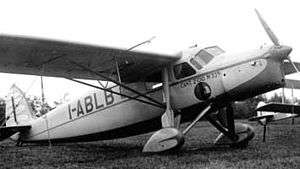Alfa Romeo 110
The Alfa Romeo 110 was an Italian four cylinder air-cooled inverted inline engine for aircraft use, mainly for trainers and light aircraft. The Alfa Romeo 110 was based on the de Havilland Gipsy Major, with approximately 500 units produced. Derivatives of the 110 include the -1, ter and Alfa Romeo 111[1] (possibly a mis identification of the 110-1).
| Alfa Romeo 110 | |
|---|---|
 | |
| Type | Piston aircraft engine |
| Manufacturer | Alfa Romeo |
| First run | 1930s |
| Number built | ~500 |
Variants
- Alfa 110-1
- (110-1): 96.94 kW (130 hp) at 2,350 rpm
- Alfa 110ter
- 108.13 kW (145 hp) at 2,350 rpm
- Alfa 111
- 115.58 kW (155 hp)[1]
Applications

A CANT Z.1010, powered by an Alfa Romeo 110-1
- Ambrosini SAI.10
- Fiat G.2/2
- CANSA C.5B/1
- CANT Z.1010 Balilla
- CANT Z.1012
- Saiman 202
- Ambrosini S.1001 (110ter)
- Agusta CP-110 (110ter)
Specifications (110-1)
Data from Jane's All The World's Aircraft 1938[2] Italian Civil and Military aircraft 1930–1945[1] Aircraft Engines of the World 1945[3]
General characteristics
- Type: four-cylinder inverted air-cooled inline engine
- Bore: 118 mm (4.65 in)
- Stroke: 140 mm (5.51 in)
- Displacement: 6.125 l (373.77 cu in)
- Length: 1,642 mm (64.65 in)
- Width: 498 mm (19.61 in)
- Height: 825 mm (32.48 in)
- Dry weight: 136 kg (299.83 lb)
- Frontal Area: 6.1 sq ft (0.6 m2)
Components
- Valvetrain: Two valves per cylinder, operated by push-rods and rocker arms
- Turbocharger: 275.8–310.3 kPa (40–45 psi), dry sump with one pressure and three scavenge pumps
- Oil grade (viscosity): 20.5 cSt (100 S.U. secs)
- Oil consumption: 0.01095 kg/(kW h) (0.018 lb/(hp h))
- Cooling system: Air-cooled
- Starter: Eclipse inertia starter
- Ignition: 2x Marelli SA-4 magnetoes,2x 14 mm (0.55 in) short reach spark plugs per cylinder.
Performance
- Power output:
- Maximum power (110-1): 96.94 kW (130 hp) at 2,350 rpm
- Maximum power (110ter): 108.13 kW (145 hp) at 2,350 rpm
- Maximum power (111): 115.58 kW (155 hp) at 2,100 rpm
- Normal (110-1): 89.48 kW (120 hp) at 2,100 rpm
- Normal (110ter): 96.94 kW (130 hp) at 2,100 rpm
- Cruising (110-1): 67.11 kW (90 hp) at 1,500 rpm
- Compression ratio: 5.5:1
- Specific fuel consumption: 0.318 kg/(kW h) (0.523 lb/(hp h)) (take-off)
- Power-to-weight ratio: 0.712 kW/kg (0.433 hp/lb)
gollark: They have cooldowns though.
gollark: Ah, soulpeace's expunge, yes.
gollark: Basically, æons have precognition, pinks have influence, whites have ward, reds have incubate, magis have teleport, purples have fertility, greens have earthquake, plus there are some other more exotic ones (bite, corporealize).
gollark: Yep!
gollark: White dragons: stop eggs dying of sickness for 6 hours (quite useless)
See also
Comparable engines
- Cirrus Minor
- Cirrus Major
- de Havilland Gipsy
- de Havilland Gipsy Major
- Elizalde Tigre IV
- Hirth HM 504
- Menasco C4
Related lists
Notes
- Thompson, Jonathan W. (1963). Italian Civil and Military aircraft 1930–1945. USA: Aero Publishers Inc. p. 295. ISBN 0-8168-6500-0. LCCN 63-17621.
- Bridgman, Leonard (ed.) (1938). Jane's All The World's Aircraft 1938. London: Sampson Low and Marston Co. Ltd. pp. 67d–68d.CS1 maint: extra text: authors list (link)
- Wilkinson, Paul H. (1945). Aircraft engines of the World 1945 (2nd ed.). New York: Paul H. Wilkinson. pp. 282–283.
References
| Wikimedia Commons has media related to Alfa Romeo 110. |
- Bridgman, Leonard (ed.) (1938). Jane's All The World's Aircraft 1938. London: Sampson Low and Marston Co. Ltd. pp. 67d–68d.CS1 maint: extra text: authors list (link)
- Gunston, Bill (1986). World Encyclopedia of Aero Engines. Wellingborough: Patrick Stephens. p. 9.
This article is issued from Wikipedia. The text is licensed under Creative Commons - Attribution - Sharealike. Additional terms may apply for the media files.